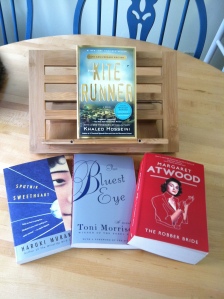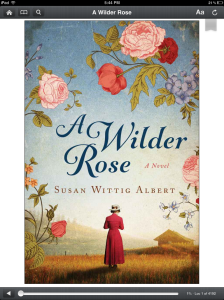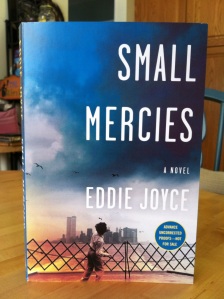
The Kite Runner
by Khaled Hosseini
400 pages
$16.00 US
ISBN 9781594631931
The Bluest Eye
by Toni Morrison
224 pages
$14.00 US
ISBN 9780307278449
I realize that it is only the second week of March, but I was lucky enough to read some incredible books already this year. So. . .drumroll. . .the first installment of the Best Books of 2015 So Far! I read a total of twenty-three books during January and February, and quite a lot of them were very good books. Probably because my to-be-read (TBR) pile was (is) so large that statistically, it cannot help but include some big winners. My top 4 so far are: “The Kite Runner” by Khaled Hosseini; “The Bluest Eye” by Toni Morrison; “The Robber Bride” by Margaret Atwood; and “Sputnik Sweetheart” by Haruki Murakami.
When I read these four books, they knocked me out of my seat. First, let me say that most of these contain some disturbing scenes and plot lines, so it feels a bit strange to say that I “loved” them. Maybe it is that my vocabulary that isn’t well-developed enough. Or perhaps it is just a fault of every bibliophile’s language – we love that a book makes us recoil, rage against unjust events, and breaks our hearts. Especially when in the hands of a writer so gifted that you can be seduced into the narrative, and pulled along seemingly against your will. All of these books did that for me. Today’s review concerns “The Kite Runner and “The Bluest Eye,” and the next installment will discuss “The Robber Bride” and “Sputnik Sweetheart.”
In “The Kite Runner,” the protagonist is Amir, who we follow during his childhood in Afghanistan, during his emigration with his father to the United States, and his return to Afghanistan in an attempt to heal the relationship with his childhood friend Hassan. One of the many interesting dynamics of this friendship is that Amir’s friend was his servant, but we also discover additional information regarding the ties between Amir and Hassan later in the novel. The story begins in Afghanistan in 1975, when the country is ruled by a monarchy, and the narrative continues to early in 2002.
Hosseini, in his first novel, beautifully describes the larger issues of class distinctions, religious differences, and the experience of emigrating to another country. Astoundingly, Hosseini also manages to convey a great deal of information regarding Afghanistan during this time period, without sounding preachy, or being at all dry. But just as beautifully, it describes family relationships, and the betrayal of friends. Just not in the way you would necessarily expect. It is one of those books where you love two characters and know that something awful is about to pass between them, to the point where you actually begin saying “no!” out loud. This book contains all that is beautiful, and all that is terrifying, in human nature. It is a book that I will always recommend be read at least once, by as many people as possible.
The next book I am recommending today is “The Bluest Eye” by Toni Morrison. I was recently asked by someone to summarize in one or two sentences, at the most, why I recommend this book. Here is the response that I gave: “I love this book, which may sound like a strange thing to say given the terrible things that Pecola endures. In my opinion, it is a very moving account of discrimination and marginalization, economic enslavement subsequent to literal slavery, and the ways in which humanity abuses one another, but written in such beautiful prose that you can’t stop reading it, even if you wanted to.” It sounds similar to my review of “The Kite Runner” doesn’t it? I had not planned to read these books so close together in time, but that is what happened.
This year, I decided that I would make an effort to read several authors in particular – Toni Morrison, Margaret Atwood, and Haruki Murakami. That isn’t asking much, right? (Of course, I will be reading many other authors and books, and I worry that I sound like a book snob saying that I wanted to make an effort with these three. I hope I don’t sound like that.) I started with Morrison because a couple of years ago, I was driving to a work appointment when I suddenly realized that I was driving down the block of homes where Toni Morrison was living. I pulled over and stopped the car for a minute, which seems like a crazy stalker sort of thing to do. But when the realization hit me as to where I was, I took a minute to think about my life, her life, and just – life. So that is how strongly I felt about Ms. Morrison before I even began reading this book.
And when I began reading “The Bluest Eye,” it was so intense that I immediately felt like I was running down a street with Morrison, being chased by a pack of dogs, until we finished the book. “The Bluest Eye” was the first published novel by Toni Morrison, and it tells the story of eleven year-old Pecola, who is a black child living in Ohio in 1941. Her story is told by her own thoughts, as well as those of the people with whom she interacts – other children, parents, shopkeepers, and neighbors. Pecola’s strongest wish is that she could change her eye color from brown to blue, because the pretty blue-eyed girls seem to be more loved and accepted by everyone. It already sounds heart-breaking, doesn’t it, but in our journey we learn quite a few other things about Pecola that are even more distressing.
In telling Pecola’s story, Morrison easily causes us to be both repulsed by certain characters, and to recognize ourselves in others. In my darker, more frustrated moments, I have sounded like Mama during her “three quarts of milk” rant, after someone drank all of family’s milk. Ouch. I have now tried to be more watchful of my ranting. Books change you. Books should change you. In my opinion, at least.
It also made me think about an incident that happened when I was ten or eleven years old and living in Texas. Our class in school went away to a camp in a rural area, maybe because we lived in an urban area. I can’t remember why. But I do remember trying to sleep the first night. My hair was still blonde (but my eyes were brown.) As I was lying in the bunk bed, two girls from a different school, and who I had never seen before, held me down and dug their fingernails into my scalp until it bled, and ripped out some of my hair by the roots. I kept screaming until finally a girl from my class came over and hit the other girls until they stopped. Then she crawled into my bed to protect me for the rest of the night. She was so brave, and I learned a lot about courage from her. For many months, maybe even a year or so, I would get scabs in my scalp that would fall off and then form again, in a cycle that I was worried would never end. I brushed my hair over them so no one would see. My point is that I never really understood why those girls did it. I didn’t think much about it, I just tried to put it behind me. But now I may have a better understanding of why, and my heart breaks for them, as it does for Pecola. I hope they had a better experience in life than she did.
This is my way of saying that I felt moved, and not just touched, by this book. (See Toni Morrison’s “Forward” for more on this topic.) This is an amazing book, that I wish everyone would read. Multiple times, at different ages and stages of life.
So these are my two reviews for today. What are your favorite books of the year so far? Is there a books that has changed you? Let me know in the comments!


